Hedd Wyn: The shepherd poet of Passchendaele
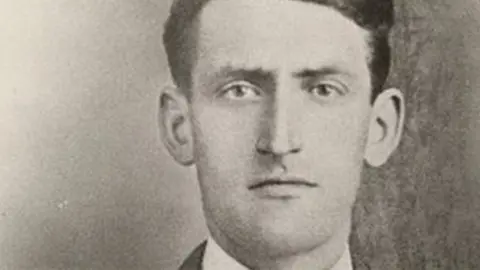 SNPA
SNPAThe Somme, Amiens, Mametz Wood - names synonymous with the tragic loss of World War One. Another is Passchendaele - the Third Battle of Ypres - with nearly half-a-million men on both sides killed in three months of fighting. On the first day - 31 July, 1917 - the Welsh poet Hedd Wyn fell in those Belgium fields.
"Chaired bard dead?" screamed the headline - "National Sensation".
"It is rumoured in bardic secret circles that the chairing today is likely to be a startling and very sad ceremony."
It is 6 September, 1917, and the message is being telegraphed to the Cambria Daily Leader newspaper, from Birkenhead on Merseyside.
It is the venue for the National Eisteddfod, and the day of the most prestigious ceremony - the chairing of the winning poet.
A few hours later, the nom-de-plume of the winner rang out: "Fleur de lis."
There was no answer.
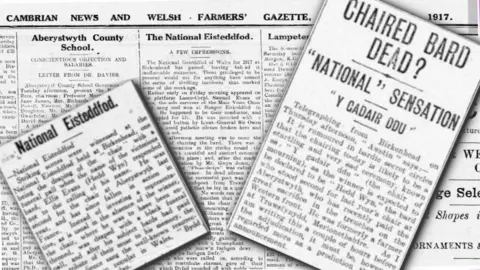 NAtional Library of Wales
NAtional Library of WalesEllis Humphrey Evans - Hedd Wyn - had fallen on the first day of the Third Battle of Ypres, better known as Passchendaele.
Seven months earlier, the 30-year-old Gwynedd farmer had been conscripted at Blaenau Ffestiniog.
According to his nephew, Gerald Williams, the poet had no wish to fight - but had little choice.
"When the second child on a farm came to the age of 18, the eldest son had to go - had to go, they had no choice," said Mr Williams.
"Ellis had to go to war."
He was sent to the Litherland Camp near Liverpool for training - coincidentally, it is claimed, at the same time as another World War One great poet - Siegfried Sassoon.
In March and then in July, he returned to the family farm - Yr Ysgwrn - to help with ploughing duties, and then hay-making.
His nephew said the poet overstayed his leave in June, and was arrested for being absent without leave, before being shipped out to France with 15th Royal Welsh Fusiliers.
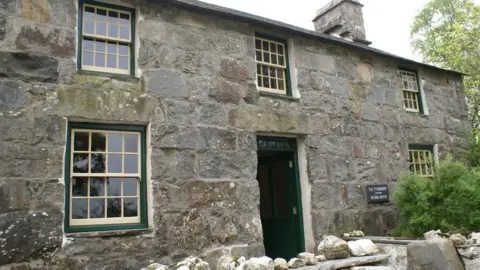
He joined his battalion at Nord-Pas-de-Calais at the beginning of July, where he finished and posted his poetic masterpiece, Yr Arwr - The Hero, to the Eisteddfod.
Just two weeks later, at dawn on 31 July, he went over the top.
"I've heard many say that they were with Hedd Wyn and this and that - well I was with him - as a boy from Llanuwchllyn and him from Trawsfynydd," recalled Simon Jones, a veteran of the battle, who both trained and fought with the poet.
In an interview in 1975 for St Fagans National Museum of History in Cardiff, the old soldier described what happened.
"I saw him fall and I can say it was a nosecap shell in his stomach that killed him. You could tell that," he said.
"You couldn't stay with him - you had to keep going, you see?
"He was going in front of me, and I saw him fall on his knees and grab two fistfuls of dirt. Well, there was nothing but dirt there, you see - the place was all churned up."
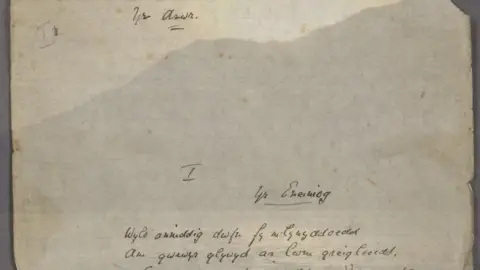 NAtional Library of Wales
NAtional Library of WalesWas there anything he could have done to help the fallen poet?
"Nothing at all. No. There were stretcher-bearers coming up behind us, you see," he stated.
"You'd be breaking the rules if you went to help someone who was injured when you were in an attack. Your business was to keep going.
"To be honest, you had no time to sympathise because you didn't know whether you'd be in the same situation as him in a couple of yards."
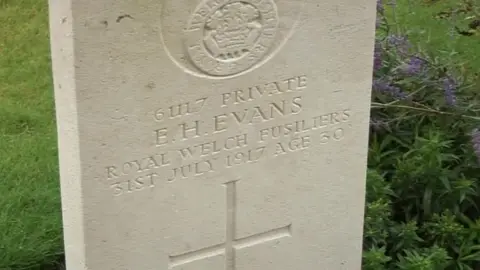
The fatally wounded poet was taken to a nearby first-aid station and asked a doctor: "Do you think I will live?"
He died at about 11:00 - one of 25,000 British casualties in the first day of the battle to take Pilckem Ridge, according to War Cabinet papers.
By November, when the offensive was over, estimates put British dead or wounded at up to 275,000 - with another 200,000 or more on the German side.
At the National Eisteddfod, the man responsible for leading the war effort, Prime Minister David Lloyd George, was sitting with the crowd for the chairing ceremony.
"In dead silence, it was announced that the successful poet was 'Hedd Wyn' - the shepherd-poet from Trawsfynydd... lay in a quiet grave," reported The Cambrian News and Merionethshire Standard.
"No words can adequately describe the wave of emotion that swept over the vast audience when the chair was draped with the symbols of mourning, and when Madame Laura Evans Williams was called on to sing the chairing song, there was hardly a dry eye in the place."
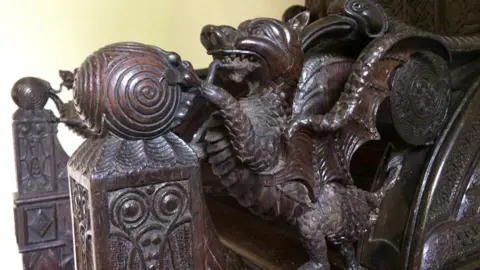
The Black Chair - Y Gadair Ddu - was taken by train to Trawsfynydd where the "sad spectacle was witnessed... when the bardic chair won by the soldier bard, Pte Ellis Evans, at Birkenhead, was brought home".
"A crowd assembled at the station and formed in procession which, headed by several bards, proceeded to the village hall, where a memorial meeting was held," the local newspaper reported.
Perhaps it is ironic. The chair itself was made by a man fleeing the conflict in Belgium, refugee, Eugeen Vanfleteren. And there, Hedd Wyn - or Blessed Peace, as the name translates - is where the poet fell.
The chair now resides at the farm where he lived, a newly-refurbished museum and visitor centre to remember both the poet and the sacrifice of his community during the Great War.
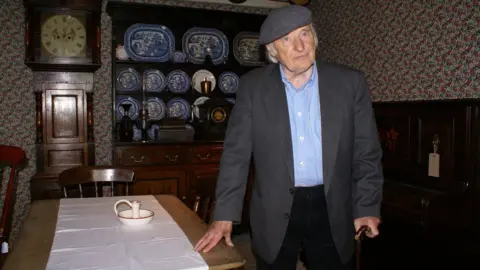
"Hedd Wyn - he symbolises the rest of the boys that were lost," said his nephew, who still lives on the farm grounds.
"All the cream of the young men had been killed - a whole generation wiped out - for what?
"I don't know - it doesn't make sense whatsoever. I don't understand war at all."
- Hedd Wyn: The Lost War Poet is on BBC Two Wales on 5 August at 9pm or iPlayer after that
